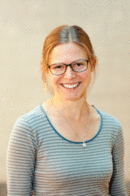Hermine Bähr
hermine.baehr@uni-erfurt.deDoktorandin (Max-Weber-Kolleg für kultur- und sozialwissenschaftliche Studien)
Sprechzeiten
nach Vereinbarung
Besucheranschrift
Max-Weber-Kolleg für kultur- und sozialwissenschaftliche Studien
Campus
Nordhäuser Str. 63
99089 Erfurt
Postanschrift
Universität Erfurt
Max-Weber-Kolleg für kultur- und sozialwissenschaftliche Studien
Postfach 90 02 21
99105 Erfurt

Zur Person
Curriculum Vitae
- 2010 - 2014 B.A. Staatswissenschaften; Sozialwissenschaften und Wirtschaftswissenschaften, Universität Erfurt
- 2014 - 2016 M.Sc. Environmental Studies and Sustainability Science, Lund University
- 2018 Pre-Doc Stipendiatin am Max-Weber-Kolleg Erfurt
- Ab April 2019 Doktorandin am Max-Weber-Kolleg Erfurt
Forschungsprojekt
Laboratories of Transformation. Transdisciplinary Knowledge Production in a 'Real-World Lab' of Energy Transition
The aim of this study is to examine the production of transdisciplinary knowledge in the context of real-world laboratories. The concept of transdisciplinarity describes the intentionally installed research setting of hybrid knowledge production at the science-public nexus that is aiming to solve pressing societal challenges. Especially in the context of climate change, sustainable development and urban planning, so-called real-world laboratories are implemented to co-create 'robust' and 'socially relevant' knowledge that leads to social change. In transdisciplinary research projects of transformative science, knowledge and transformation are combined.
This project seeks to investigate - by making use of an ethnographic analysis - how practices of knowledge production change under the condition of research done in the hybrid setting of a real-world laboratory. Laboratory Studies in the field of Science and Technology Studies (e.g. Woolgar & Latour) described how solid facts are produced in research laboratories, whereas this study investigates how a context-specific understanding of an issue of concern gets settled in a real-world lab.
When the practice of science, or doing research, is the process of transforming diffuse and resistant issues and noisy realities into neat entities i.e. mobile universal facts and ordered conditions, what is done in transdisciplinary settings where other - non-scientific - practices of knowledge production are included?

